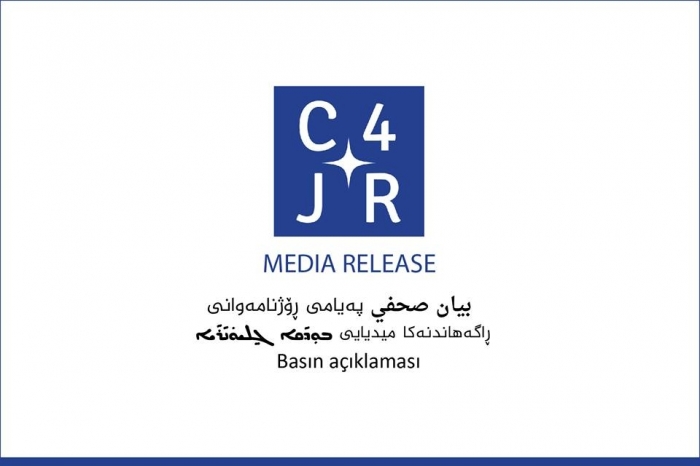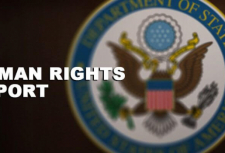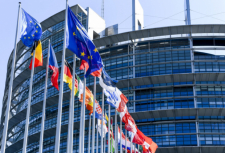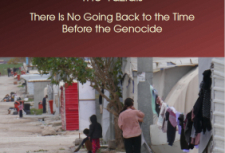Survivors yazidis and their families cannot wait any longer Draft Law on Reparations for Survivors of Conflict Related Sexual Violence Committed During the ISIS Conflict in Iraq

Ezidi 24 – Following
More than a year has passed since the Iraqi presidency submitted a Yazidi Female Survivors’
Law to the Iraqi parliament for review and approval. This was a most welcome step, but more progress is needed.
25 Iraqi civil society organizations allied into a Coalition for Just Reparations (C4JR), composed
the Draft Law on Reparations for Survivors of Conflict Related Sexual Violence Committed During the ISIS Conflict in Iraq (C4JR Draft Law) to put the spotlight on pressing needs of the survivors.
C4JR seeks to revive the public debate on reparations for survivors of conflict-related sexual violence in ISIS created conflict in Iraq with the goal of improving the Yazidi Female Survivors’
Law and getting it adopted in the Iraqi parliament.
C4JR Draft Law:
• applies to all survivors of sexual violence committed during ISIS conflict in Iraq
notwithstanding their ethnic or religious affiliation, gender, current place of residence
or identity of the perpetrator
• does not discard the Yazidi Female Survivors’ Law but builds on its framework (it keeps
provisions assuring compensation, recognition of genocide against Yazidis, prohibition
of amnesty for perpetrators, commemoration, remembrance and many others)
• makes maximal use of the international human rights standards governing reparations
for survivors of sexual violence in conflict
• envisages not only compensation (monthly salary, residential land, housing and
assistance in securing livelihoods) but also a range of other reparative measures
(restitution (re-employment, continued education, restoring of public services, infrastructure and religious objects), rehabilitation (mental health, medical and legal services, educational opportunities, livelihood programs, family counselling and community oriented programs), satisfaction (recognition that ISIS committed genocide against Yazidis and atrocity crimes against other minorities, apology, remembrance
days (‘National Day to Eliminate Sexual Violence in Conflict’ and National Day of Remembrance of the Yazidi Genocide), construction of monuments and amending education curricula) and guarantees of non-repetition (legal reform aimed at preventing gender-based violence and ensuring gender equality))
• reaffirms state obligation to seek whereabouts and rescue survivors that are still in ISIS
captivity by proposing a specialized database and regular briefings of affected families; and to return remains of those deceased to their families for proper burial
• envisages a reimbursement of costs families incurred during rescue operations would produce a transformative effect by preventing gender-based violence and promoting equality, in law and fact, between men and women in Iraq
• envisages meaningful participation of survivors in its implementation
• envisages substantial involvement of NGOs in its implementation
• employs the best interest of the child as a main principle in dealing with children conceived through acts of conflict-related sexual violence
• sets forth annual independent external audit of financial records of all reparations related expenditures to prevent corruption and misuse of funds
• suggests survivor friendly application procedure and a relaxed evidentiary standard for processing reparation claims to mitigate difficulties that survivors may face in obtaining evidence in support of their claim
• introduces a right to an appeal to a first instance decision rejecting the reparation claim
By enacting this law Iraqi authorities will not only fulfil their obligations specified in the Joint
Communiqué between the Republic of Iraq and the United Nations on the Prevention and
Response to Conflict-Related Sexual Violence (2016), but also set an example for other-post
conflict states on how to recognize, honour and repair harm done to the survivors of sexual
violence in conflict.
C4JR invites survivors, Iraqi authorities, national and international organizations and all people
of good will to support solutions set forth in C4JR Draft Law, challenge them by offering viable alternatives or otherwise engage in the discussion.
About C4JR:
C4JR is an alliance of Iraqi civil society organizations representing Iraq’s linguistic, ethnic and religious diversity, supporting reparation claims of survivors and other victims of crimes
perpetrated during the conflict with the self-declared Islamic State in Iraq and Syria. C4JR draws on international human rights and national law to advance the right to reparations of all civilian victims of ISIS armed conflict in Iraq.
For more information about C4JR, go to www.c4jr.org
Tags: #yazidisinfo #newsyezidi #genocideyezidi #ezidi24
Survivors yazidis and their families cannot wait any longer Draft Law on Reparations for Survivors of Conflict Related Sexual Violence Committed During the ISIS Conflict in Iraq

Ezidi 24 – Following
More than a year has passed since the Iraqi presidency submitted a Yazidi Female Survivors’
Law to the Iraqi parliament for review and approval. This was a most welcome step, but more progress is needed.
25 Iraqi civil society organizations allied into a Coalition for Just Reparations (C4JR), composed
the Draft Law on Reparations for Survivors of Conflict Related Sexual Violence Committed During the ISIS Conflict in Iraq (C4JR Draft Law) to put the spotlight on pressing needs of the survivors.
C4JR seeks to revive the public debate on reparations for survivors of conflict-related sexual violence in ISIS created conflict in Iraq with the goal of improving the Yazidi Female Survivors’
Law and getting it adopted in the Iraqi parliament.
C4JR Draft Law:
• applies to all survivors of sexual violence committed during ISIS conflict in Iraq
notwithstanding their ethnic or religious affiliation, gender, current place of residence
or identity of the perpetrator
• does not discard the Yazidi Female Survivors’ Law but builds on its framework (it keeps
provisions assuring compensation, recognition of genocide against Yazidis, prohibition
of amnesty for perpetrators, commemoration, remembrance and many others)
• makes maximal use of the international human rights standards governing reparations
for survivors of sexual violence in conflict
• envisages not only compensation (monthly salary, residential land, housing and
assistance in securing livelihoods) but also a range of other reparative measures
(restitution (re-employment, continued education, restoring of public services, infrastructure and religious objects), rehabilitation (mental health, medical and legal services, educational opportunities, livelihood programs, family counselling and community oriented programs), satisfaction (recognition that ISIS committed genocide against Yazidis and atrocity crimes against other minorities, apology, remembrance
days (‘National Day to Eliminate Sexual Violence in Conflict’ and National Day of Remembrance of the Yazidi Genocide), construction of monuments and amending education curricula) and guarantees of non-repetition (legal reform aimed at preventing gender-based violence and ensuring gender equality))
• reaffirms state obligation to seek whereabouts and rescue survivors that are still in ISIS
captivity by proposing a specialized database and regular briefings of affected families; and to return remains of those deceased to their families for proper burial
• envisages a reimbursement of costs families incurred during rescue operations would produce a transformative effect by preventing gender-based violence and promoting equality, in law and fact, between men and women in Iraq
• envisages meaningful participation of survivors in its implementation
• envisages substantial involvement of NGOs in its implementation
• employs the best interest of the child as a main principle in dealing with children conceived through acts of conflict-related sexual violence
• sets forth annual independent external audit of financial records of all reparations related expenditures to prevent corruption and misuse of funds
• suggests survivor friendly application procedure and a relaxed evidentiary standard for processing reparation claims to mitigate difficulties that survivors may face in obtaining evidence in support of their claim
• introduces a right to an appeal to a first instance decision rejecting the reparation claim
By enacting this law Iraqi authorities will not only fulfil their obligations specified in the Joint
Communiqué between the Republic of Iraq and the United Nations on the Prevention and
Response to Conflict-Related Sexual Violence (2016), but also set an example for other-post
conflict states on how to recognize, honour and repair harm done to the survivors of sexual
violence in conflict.
C4JR invites survivors, Iraqi authorities, national and international organizations and all people
of good will to support solutions set forth in C4JR Draft Law, challenge them by offering viable alternatives or otherwise engage in the discussion.
About C4JR:
C4JR is an alliance of Iraqi civil society organizations representing Iraq’s linguistic, ethnic and religious diversity, supporting reparation claims of survivors and other victims of crimes
perpetrated during the conflict with the self-declared Islamic State in Iraq and Syria. C4JR draws on international human rights and national law to advance the right to reparations of all civilian victims of ISIS armed conflict in Iraq.
For more information about C4JR, go to www.c4jr.org
Tags: #yazidisinfo #newsyezidi #genocideyezidi #ezidi24


























